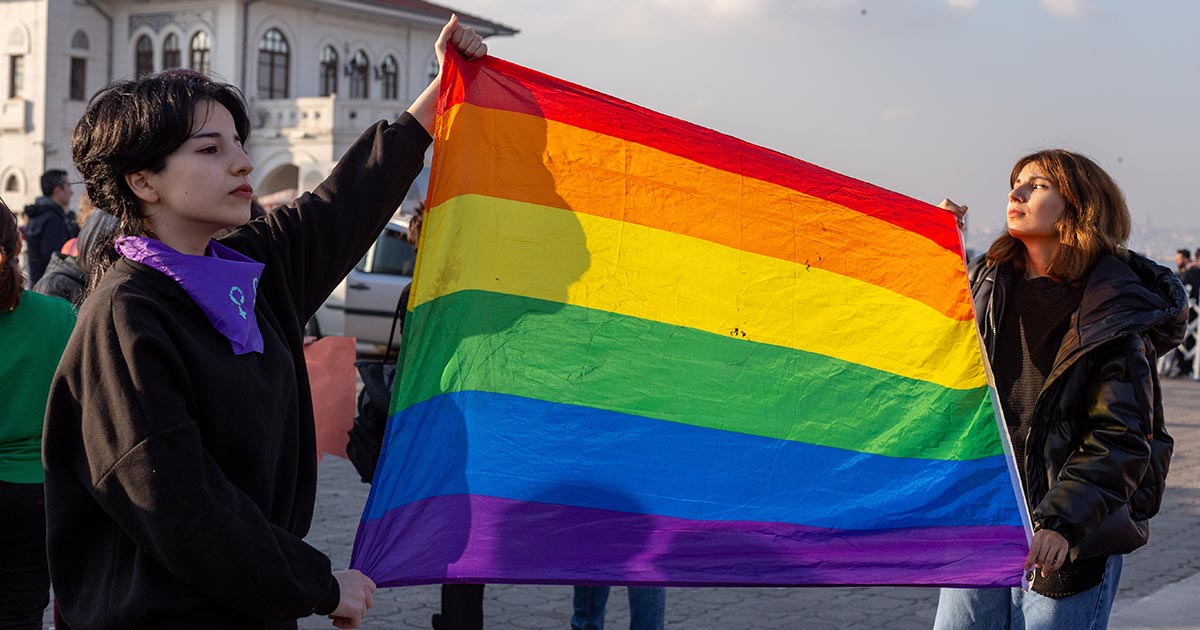Turkey’s crackdown on Pride marches triggers mass detentions

Women’s rights and LGBTI organizations protested against the government in Istanbul in January (Photo: tolga ildun / Shutterstock.com)
Human Rights Watch has condemned the Turkish government’s aggressive actions against Pride marches, after police detained 113 individuals during the Istanbul Pride March on June 25th.
The ban on the march marked the ninth consecutive year, and all other Pride events in the city were also prohibited, with Governor Davut Gül citing a “threat to the institution of the family” as the reason.
In the western city of Izmir, where similar Pride demonstrations were banned, at least 52 people were detained. Although most of the detainees were released a few hours later, the whereabouts of five foreign individuals remain uncertain.
“Banning Pride celebrations and detaining people for attempting to march is a flagrant violation of the right to peaceful assembly and expression and further evidence of the Turkish government’s vitriolic campaign against LGBT people,” said Hugh Williamson, Europe and Central Asia director at Human Rights Watch.
He called on Turkey to respect its international obligations and domestic laws by ceasing the detention and prosecution of Pride demonstrators and ensuring their fundamental right to peaceful protest.
While recent judicial decisions have ruled the comprehensive bans on Pride marches and events as unlawful, they have come too late to guarantee the exercise of the right to assembly for LGBT individuals.
In the past three years, courts in Istanbul, Ankara, Izmir, Mersin, and Adana have declared that the prohibition of Pride marches without clear evidence of an imminent danger violates Turkey’s Constitution and the European Convention on Human Rights.
However, these court rulings have been issued long after the decisions to ban events, and public authorities have consistently disregarded them.
In March, the Committee of Ministers of the Council of Europe ordered the Turkish government to guarantee the right to assembly by amending the relevant law, bringing it in line with the case law of the European Court of Human Rights. This decision came after examining over 70 applications concerning disproportionate interference in assemblies and demonstrations in Turkey over a period of more than 15 years.
The bans on Pride marches and related LGBT assemblies align with the government’s pattern of discriminatory statements against the LGBT community says Human Rights Watch. President Recep Tayyip Erdoğan’s campaign for the recent 2023 elections prominently featured anti-LGBT rhetoric, with the government even suggesting potential constitutional amendments to protect the institution of marriage as a union between a man and a woman.
In his election victory speech on May 28, Erdogan again targeted LGBT people and has continued to do so in subsequent speeches. On June 21, he referred to LGBT people as the “calamity that threatens the survival of our society.”
“Both the European Court of Human Rights and Turkey’s own courts have ordered the government to guarantee the right to assembly,” Williamson said. “Bans on Pride marches and events and police intervention are nothing more than unlawful intimidation tactics aimed at dissuading people from exercising their right to peaceful assembly.”
Leave a Reply